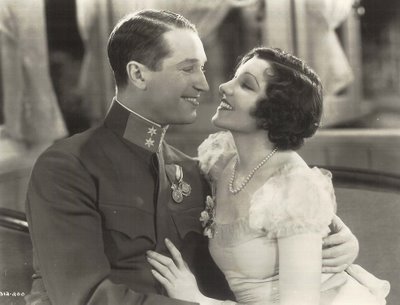
Monday Glamour Starter --- Claudette Colbert
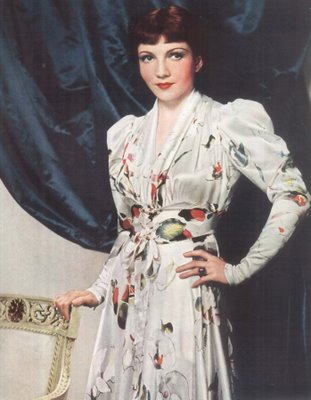
 I was in the Washington, D.C. airport about twenty years ago when an announcement came over the loud speakers --- Would Miss Claudette Colbert please come to the information desk? I stopped cold in my tracks, much as John Sheppard/Shepperd Strudwick did in Remember The Day (Miss Trinell!). Was I hearing things? No, they repeated it. Miss Claudette Colbert, please come to the information counter. Having my own plane to catch, what could I do? To this day, there’s no doubt in my mind it was she they were calling. I mean, how many Claudette Colberts could there be? Had that announcement come forty years earlier, there would have been a mass exodus toward that counter. I have to assume the attendant had no idea whom she was addressing. But here’s the remarkable thing --- Claudette Colbert was working at the time --- back on the boards with Rex Harrison after she’d passed eighty. It’s not as though she needed the money, for there was plenty of that, plus an estate in Barbados. If they’d passed out ribbons for Smartest Actress in the Golden Age biz, Claudette would have surely collected, for she never put a foot wrong. Success was mostly followed by greater success, and she enjoyed 92 years of it. Why can’t they all end up like this?
I was in the Washington, D.C. airport about twenty years ago when an announcement came over the loud speakers --- Would Miss Claudette Colbert please come to the information desk? I stopped cold in my tracks, much as John Sheppard/Shepperd Strudwick did in Remember The Day (Miss Trinell!). Was I hearing things? No, they repeated it. Miss Claudette Colbert, please come to the information counter. Having my own plane to catch, what could I do? To this day, there’s no doubt in my mind it was she they were calling. I mean, how many Claudette Colberts could there be? Had that announcement come forty years earlier, there would have been a mass exodus toward that counter. I have to assume the attendant had no idea whom she was addressing. But here’s the remarkable thing --- Claudette Colbert was working at the time --- back on the boards with Rex Harrison after she’d passed eighty. It’s not as though she needed the money, for there was plenty of that, plus an estate in Barbados. If they’d passed out ribbons for Smartest Actress in the Golden Age biz, Claudette would have surely collected, for she never put a foot wrong. Success was mostly followed by greater success, and she enjoyed 92 years of it. Why can’t they all end up like this?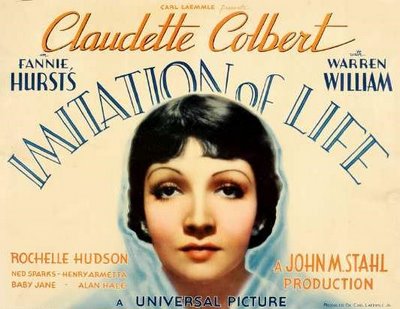
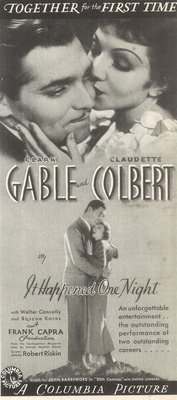
Did those mid-eighties audiences realize they were watching a sixty-year veteran of the stage? Colbert started on Broadway. She was one of its leading lights when talkies came calling. There was hesitation, owing to a bad experience with a single silent feature under Frank Capra’s direction (For the Love Of Mike). Legit having been largely wiped out by depression, she, like a lot of New Yorkers, took the Hollywood offer and tried again. For Colbert, it began with films at Astoria. She’d been raised in Gotham, though born in France. Her domineering mother maintained a strict household, addressing the children only in native tongue, which prepared Claudette to lend assist when Paramount needed French-language versions of The Big Pond and Slightly Scarlet. Early roles were along conventional paths --- her roles were interchangeable with Sylvia Sidney, Miriam Hopkins, Carole Lombard, Nancy Carroll (whom she resembled) --- how do you distinguish yourself in a bakery window filled with near identical sweets? For each step forward (The Smiling Lieutenant), there were three back (Secrets Of A Secretary). Getting noticed on assembly lines was never easy, yet this was an actress with authority none of the rest approached. Go listen to Colbert read lines in that excellent pre-code Torch Singer (if you can find it). Nobody handles dialogue so well. Apparently, it came easy. She knew she’d score from early on, and didn’t mind saying so. It wasn’t conceit … just a fact of (her) life. Acting is instinctive … either you have it or you don’t. Well, she had it in spades, and bore down from the get-go on employers who imagined they could dictate terms. Not only did Colbert get into serious money fast ($5000 a week by 1934), she took charge as well of make-up application and costume selection (and why not? --- she’d trained in commercial art at school and originally sought a career in fashion design). Hell On Wheels was how they described her, but so what when you’re right?
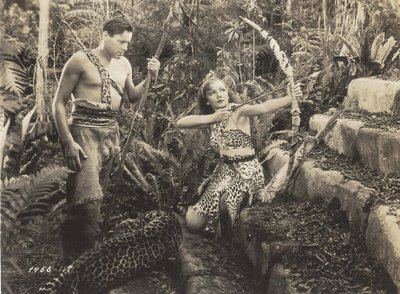
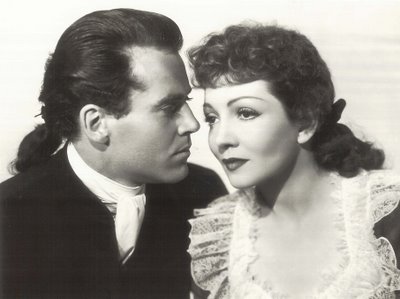
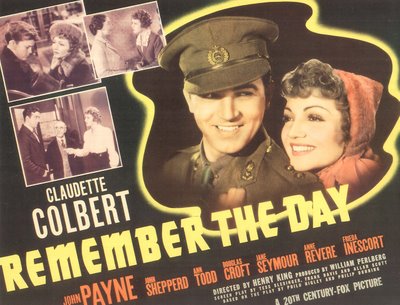

Absurd costume parts were not her strength, but they didn’t intimidate her. Playing Sign Of The Cross and Cleopatra modern seemed as good a way as any to deflect embarrassment. You could take her straight or imagine she’s sending the whole thing up. Either way was satisfying. The one that conferred immortality was It Happened One Night. I’ll depart from standard orthodoxy where this show is concerned, and chances are you know what I’m referring to: Nobody wanted to do it … Gable in the doghouse and being punished by Metro … Colbert slumming on Poverty Row, etc. All this made for good columns after smash ticket sales plus clean sweep of Academy Awards, and published histories have carried the legend forward in lock-step since, but I’ve never bought into IHON's too pat rags-to-riches tale. For starters, Capra was a recognized major talent before It Happened One Night. He’d done Flight, Dirigible, The Miracle Woman, Platinum Blonde, American Madness, Lady For A Day --- all well received and critically well-regarded. How could any project under his direction be regarded a step down? I think a lot of this was Capra’s own myth-making helped in no small way by thirty or so years passed between the film’s release and his autobiography, together with willingness on the part of latter-day interviewers to accept FC's colorful revisions without question. One thing’s sure --- Claudette Colbert was difficult on the set, but that would have been case in any event, owing to increased clout and willingness to exercise a star’s prerogative. It Happened One Night might have proved a mixed blessing, for both she and Gable were fated to revisit this formula in any number of less inspired retreads as a decade wore on --- madcap heiresses and cocksure reporters becoming increasingly unwelcome as producers sought to make it all happen just one more night.
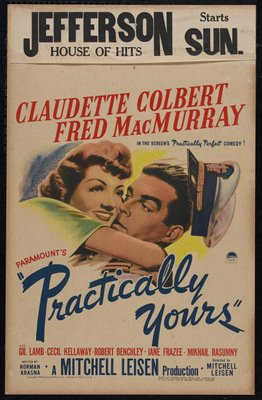
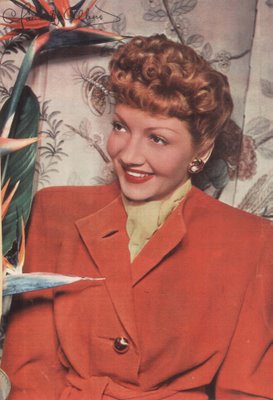
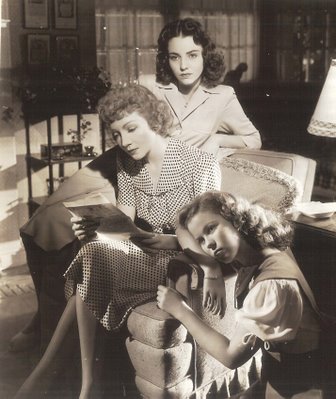
Another tall story may be this business about Colbert’s refusal to be photographed from the right side. No doubt there’s some truth in it, but sets rebuilt? I mean, torn down and rebuilt? Did anyone have that much juice during the studio era? Probably another of those long-bearded press agent fabs that somehow transitioned into primary resource for writers all too willing to believe what they read in Hedda Hopper’s old dailies. Colbert was carefully photographed. She saw to that. They say this actress understood a camera better than Dietrich. Again, she likely knew best, for having remained seemingly ageless if nothing else. Her own explanation cited an avoidance of standard vices, and you can add the sun to this list. She stayed away from that and never wrinkled. Others did not and ended up looking like Randy Scott’s old saddlebag. Mother parts she embraced early on, unafflicted with (apx.) same-age Norma Shearer’s vanity in that respect (N.S. having turned down both Now, Voyager and Mrs. Miniver because she was "too young" for such roles). Since You Went Away was most triumphant of these, but there was other outstanding work during those apex years of the late thirties/early forties. She aged onscreen as Remember The Day’s lifelong schoolmarm. If there’s a better performance than hers in this, I’ve not seen it. Fox Movie Channel schedules R.T.D. often. Watch it next time. You’ll break down in tears. Fantastic movie. Then there’s Drums Along the Mohawk, grim, but a John Ford masterpiece. There’s a DVD of that. The Palm Beach Story is one of the better Preston Sturges comedies. Wish she’d done more of them. All those Paramount laffers with Fred MacMurray appear to be buried deep as Ramses’ tomb, but hope springs eternal that present owner Universal will unearth them. No Time For Love is among the funnier of these, but none are without interest. By 1945, Colbert would be out of Paramount and free-lancing. Her price? --- $150,000 per picture. Her motivation to work? --- probably not considerable, since she’d married well (a second time, to a prominent doctor). Her social life combined Hollywood’s elite with the richest among L.A.’s medical community. Colbert was becoming a social lioness if not a continuing boxoffice lure. The late forties saw the initial decline. Sometimes she got lucky in a fluke like The Egg and I, but that one hit because it introduced the Kettles (as in Ma and Pa), who’d go on to popularity eclipsing even Colbert’s. By now, she was noticed as much for parts she lost as ones she took. State Of The Union was a final clash with Capra. Such were Colbert’s demands that he finally replaced her with Katherine Hepburn. All About Eve was written with her in mind, but a back injury performing stunts (!) in Three Came Home paved the way for Bette Davis to move in and give perhaps her finest performance. The loss would rankle Colbert for the rest of her life, as there were no more offers so promising as this. Television was a port of call throughout the fifties. She even touted Maxwell House coffee on the small screen, but not from hunger. Work remained, as it had always been, something to keep her busy, though she’d acknowledge regret for not having been more aggressive in seeking better projects. DeMille offered The Ten Commandments, but was turned down (to do Ford Star Jubilee instead?). After playing Troy Donahue’s mother in Parrish, she hung it up on features (well, how do you top that?). Pleas for memoirs were ignored. What’s so interesting about my life?, she’d ask, and based on the common-sense way she’d lived it, maybe not much, at least in the way of scandal and sensation. Producers still wanted her. Much of the fan mail came from young people. Ross Hunter noticed and tried to induce her to join the Airport ensemble, but no dice. The surprise eighties reemergence found her back on the stage where she’d begun, skills undiminished, and a wider audience got a last look in a 1987 TV movie, The Two Mrs. Grenvilles. She died in 1996.
Photo Captions
Claudette Colbert with Maurice Chevalier in The Smiling Lieutenant
Paramount Exhibitor Manual Portrait
Claudette as Cleopatra
Imitation Of Life Title Card
It Happened One Night Ad
With Herbert Marshall in Four Frightened People
With Henry Fonda in Drums Along The Mohawk
Title Card from Remember The Day
With Joel McCrea and Rudy Vallee in The Palm Beach Story
Window Card from Practically Yours
Paramount Publicity Portarit
With Jennifer Jones and Shirley Temple in Since You Went Away
